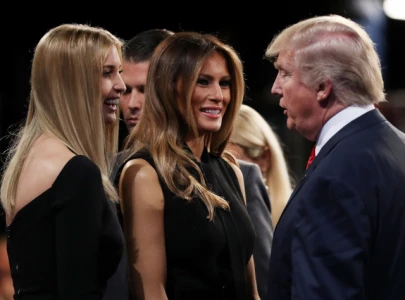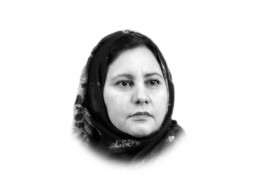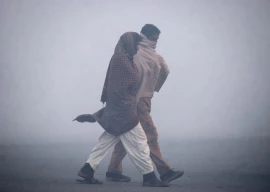
“Security agencies on both sides need to really understand that in today’s world, a security-led vision is obviously driven by economic security,” he said. “Unless you have economic security, you can’t have general security.” Shahbaz also warned that distrustful ‘security agencies’ in both Pakistan and India were one of the two main ‘blockages’ holding back plans to liberalise trade, which many believe will provide a desperately needed boost to Pakistan’s moribund economy.
In his meeting last year with his Indian counterpart Manmohan Singh, Prime Minister Nawaz Sharif went even further and almost shocked Singh by suggesting that: “We know what you are doing to us and you know what our people are doing to you, why not sit together and talk it out,” according to close Nawaz aides.
Nawaz’s reference was the alleged Indian role in Balochistan as well as the revelation last year that former Indian army chief General V K Singh created a Technical Services Division (TSD) for covert operations in Pakistan. A Hindustan Times report chronicled this venture and quoted a former TSD officer as saying: “Our main task was to combat the rising trend of state-sponsored terrorism by the ISI and we had developed contacts across the Line of Control in a bid to infiltrate Hafiz Saeed’s inner circle.” Given the history of mutual mistrust, hostility and cross-border covert operations between Islamabad and New Delhi, one can safely assume that General Singh’s TSD reflects only a small aspect of India’s possible involvement in Pakistan. If the CIA had been running alleged espionage networks through private security contractors (such as Raymond Davis), why wouldn’t India do the same to map, profile and counter India-focused groups? Also, why wouldn’t Afghan and Indian intelligence prick Pakistan where it hurts the most if they believe the ISI has been hurting them since the late 1980s?
In this context, William Dalrymple, the British historian, spoke of the Indo-Pakistan proxy war in his Brookings essay: “A Deadly Triangle: Afghanistan, Pakistan and India.” (June 25, 2013), saying that this was directly affecting Afghanistan’s peace process too.
“The hostility between India and Pakistan lies at the heart of the current war in Afghanistan…. our troops are now caught up in a complex war shaped by two pre-existing and overlapping conflicts: one local and internal, the other regional. Beyond this indigenous conflict looms the much more dangerous hostility between the two regional powers — both armed with nuclear weapons: India and Pakistan. Their rivalry is particularly flammable as they vie for influence over Afghanistan.”
Most Indian officials and observers dismiss Dalrymple’s proxy war thesis. But US diplomats (both former and serving) such as Tom Pickering, James Dobbins and Bruce Riedel have all been alluding to the proxy games both India and Pakistan have been playing. In their writings they often also sounded empathetic to “legitimate concerns of Pakistan with a 2,560 kilometre border with Afghanistan.”
That aside, it increasingly looks instructive for both Pakistan and India to disenegage their proxies and agree to synergise their strategies on Kashmir and Afghanistan.
A détente between India and Pakistan is absolutely essential for the security and economic dynamics of South Asia, particularly because the Indian narrative on Pakistan also considerably influences, if not shapes, the Kabul and Washington view on Pakistan.
During recent conversations in Washington, one could discern the relatively friendlier US tone towards Pakistan, with officials and think-tankers agreeing that it was time Islamabad cashed in the favourable mood in Washington.
They, however, also opined that think-tankers, academics, officials in Pakistan shall have to break out of the bitter past. They shall have to stop talking of why others need Pakistan. They must dilate and debate as to why Pakistan needs to end its near political isolation and reassure external players of its sincerity in dialogue on peace and economic development with New Delhi and Washington. Without doubt, an end to Indo-Pakistan proxy wars promises immense political and economic dividends.
Published in The Express Tribune, February 19th, 2014.
Like Opinion & Editorial on Facebook, follow @ETOpEd on Twitter to receive all updates on all our daily pieces.
COMMENTS (24)
Comments are moderated and generally will be posted if they are on-topic and not abusive.
For more information, please see our Comments FAQ

1726117332-0/Megan-Thee-Stallion-(1)1726117332-0-165x106.webp)

















Neither India nor Pakistan need proxy wars, the author well written article is simply following the regular covert activities which both countries use, which is a drop on the hot stone, it is the internal unrest of their unjust system which will determine the future for their people.. Pakistan current military dominated democracy is causing the aleanation of the KPK and Baluchistan people who will have no option in the end but to detach itself from Islamabad!.
Rex Minor
@Author
Economic development in both countries has nothing to do with bad relations with each other. North Korea and South Korea have had worse bilateral relations since 1950's, yet South Korea has become a developed country today, since 1947, India has performed better than Pakistan in every economic and social sector, and has one of the fastest growing economies today, second only to China. Good or bad economic performance of both nations is due to policies of their people, not how much they love or hate their neighbors.
Lets assume there was no Indo-Pak conflict, then what? You think Subcontinent would have been like Europe? There still would have been conflicts. China would have still maintained aggressive posturing towards India, its potential rival and Afghanistan would have still been hostile towards Pakistan coz it has not accepted 'Durand Line' till date.
Pakistan wants a simple solution for its every problem, be it extremism, economy, terrorism, i.e "blame India", "solve Kashmir". There are no simple solutions. Pakistan was created out of feeling of mistrust and contempt" for India, as they say, its in Pakistan's DNA to not like India and the feeling is mutual. Its a sad truth but this conflict will not end anytime soon.
@Kashif Zulfiqar: Dear Kashif sahib, I hope you are not part of chief minister Sharif's public relations team. If u r not , then u must not try to defend what he reportedly said - or tried to convey to the British newspapers. If he has said so - and I believe both brothers believe in the negative role of both establishments - he must stand by it, rather than ducking under flimsy explanations such as you are trying to come up with. Lets face the truth; we did it to Indians and now they are doing the same to us. If they are not, then they are certainly not doing their job. Frankly I don't think the are that stupid or inefficient , there is no other explanation to the widespread violence across the country. That is why I insist that regardless of claims and counter-claims, both establishments need to get together in the benefit of nearly 400 million of Indians and over 50 millions Pakistanis living below the poverty line
*
* With all due respect, while talking about India-Pakistan issues, Pakistan really needs to stop putting the whole SOUTH ASIA on plate, Pakistan is not an equal of India, you are a much smaller country, Pakistan represents only a part of South Asia i.e. 'North-Western South Asia'. Indo-Pak relation has nothing to do with Sri Lanka, Maldives, Bangladesh, Bhutan, Nepal etc. Talk only about India and Pakistan. And as far as Indo-Pak relations are concerned, Pakistan needs to let go off "Kashmir issue", live with POK and let India live with Indian state of J&K, the more Pakistan will push it the more painful it will make it for itself.
Mr. Imtiaz -please make a resolution for future articles - that you will not mention India's proxy wars without offering some evidence - officially ratified evidence - not what this or that person said.
@assad: Did you forget the proxy war started by Pakistan in 1947 and 1965?
As far as 1971 was concerned, the Mukti Bahini took up arms and training from India only after Operation Searchlight by Pakistan.
@Anjaan: Pakistan did not start the proxy war business. Do you forget that the precedence for it lies with India and the 1971 support of Mukhti Bahini against Pakistan through covert means? Perhaps your memory is short and/or selective.
@asad, you are absolutely right. India is now the least of Pakistan's worries...Nawaz Sharif may have knowingly or unknowingly pushed Pakistan off the edge of the abyss, leading to the end of Pakistan as we know it in the very near future.
Mr Imtiaz Gul, you need to re-evaluate Pakistan's security situation in light of the above, if there is anything left of it.
What about the Saudi proxy war inside Pakistan? That has destroyed Pakistani faster than India could ever dream of.
Let me compliment Mr. Gul for an excellent very candid and well researched article. We need to revisit our history and determine how proxy wars started in South Asia? Kashmir was the starting point. Notwithstanding Indian violations of not accepting right of majority, was it prudent that we introduce non state actors to fight for the state. There are two ways to settle such issues: either through a war or negotiations. We waged a war and could not terminate it at success. Instead we negotiated termination of war a weak position.
It was natural for our enemies to search soft points and they did it well. Why we fought two proxy wars on behalf of USA in Afghanistan? Can any country claim and independent state as its strategic depth? We also need to critically study our diplomacy in the col war era; the emphasis was that Pakistan will guard interests of external powers. And as a result we got into various security pacts. And Pakistan needed was weapons! Ever in our history we alined our common economic interests. The result is extreme poverty and crime. With exploding population we must be ready for difficult times. On top of it Pakistan was declared " Fort of Islam" and this brought international criminal to wage proxy wars all over the world.
Our prosperity lies essentially in our region and we need to integrate well. Any more proxy efforts by us or India, will be most detrimental for Pakistan's survival. Lastly, we need to educate our nation how to think strategically and prudently.
Looking back in history, wasn't it Pakistan which started this proxy war when Jinnah pushed in insurgents in Kashmir to capture it and later denied it? From then on, India has got back by breaking Pakistan, but the number of instances where Pakistan has to cross India is just way too many.
Kargil, 1965, Kashmir insurgency, Khalistani insurgency.
Only since India is much more institutionally, constitutionally and politically much more stable than Pakistan can ever be(thanks to our founding fathers), India has and always will have an upper hand.
This false equivalency of India's alleged support to Balochis and comparing it with Kashmiri terror is truly ludicrous.
Pakistan is fighting a proxy war with itself, as is much of the Muslim world. It is fighting the forces which claim to represent Islam. India will never push Pakistan so hard as to destabilize it, it needs a sane Government to take care of its nukes. But, the TTP have no such reservations and they are actually winning.
Pakistan should forget and give up on its proxy wars and forget Kashmir. The Winter is coming. its flag is black and its bearded and wants to impose Sharia on all of Pakistan.
how does he know both PM said this to each other.....??
A thought provoking and balanced piece on a very important topical subject which also contains sage advice to both India and Pakistan. Let us be sure that India is not going to even listen to all the advice given here, and probably does not even need to, but Pakistan better pay heed for its own sake. If Pakistan were to take the advice seriously and start acting on it, it will do no favour to anyone other than itself and its unfortunate and exploited masses. So, let better sense prevail.
That't it - keep imagining Indian hand - keep finding Indian excuse for your miseries - serves the purpose of your worst enemies because that'll be the end of you.
What you say is true sir, but our Dravidian Brahui Baloch brothers are asking for our help while migrant central asians are ethnic cleansing them, just like they did in Bengal.India is the only true leader who can keep the central asians under the heel, so perhaps after balochistan, we can have peace?
Well balanced explanation of proxy wars. I want to see comments from our eastern neighbor and their right to do it.
Author quotes Gen VK Singh's TSD trying to infiltrate Anti Indian Pakistani Jihadi group of Hafeez Sayed for intelligence gathering.Now how can that be compared with instigating separatist movement in Kashmir or Khalistan by Pakistan in India.BTW after Gen VK Singh retirement, TSD was also banned.In the interview with Express News, Mr Sartaz Aziz admitted that evidence of Indian involvement in Pakistan has yet to be shared with USA and India- why Pakistan is taking this inordinate delay, if they have any conclusive proof.
The author is right. However, the trust deficit will be hard to counter. Pakistan's past record is not easy to erase from the memories of Indians. Even if sincerity was the rule as of tomorrow, it will take a decade or so to take out the bitterness in the minds of people and strategic planners.
The author is right when he says, quote "an end to Indo-Pakistan proxy wars promises immense political and economic dividends." unquote.
The people of India do not trust the recent Pakistani overtures for peace. The people of India believe that the new found Pakistani desire for peace is not genuine, and a tactical ploy to buy time, given Pakistan's economic and security problems.
Pakistan started the proxy war with India ... it must be the one to stop it first. Punishing the perpetrators of the Mumbai massacre would be a good first step in that direction.@Author: How come Pakistan has never been able to prove India's involvement in Balochistan ? Has Pakistani governent ever provided evidences to back their claim or is always just a hearsay legends ? Has Pakistan ever taken to UN any iota of proof against Indians involvement in Balochistan so far ? A sinner always thinks evrybody commits a sin. That's his mechanism to feel good about the sin he commits. This is the case with Pakistan. Just becaiuse it so gleefully enjoys proxy war through state sponsored terrorism it would like to believe ( to justify it's own actions) that India is doing the same. Ultimately you will like to believe on what you "want" to believe. Million denials by India about it's involvenent and one comment by a disgruntled officer who was thrown out of his post for his age , and that one comment is what Pakistan "wanted" to hear so people like you use it as trump card for every argument. Finally world believes on evidences and not just hearsay. Answer to peace in the sub-continent has always lied with Pakistan.